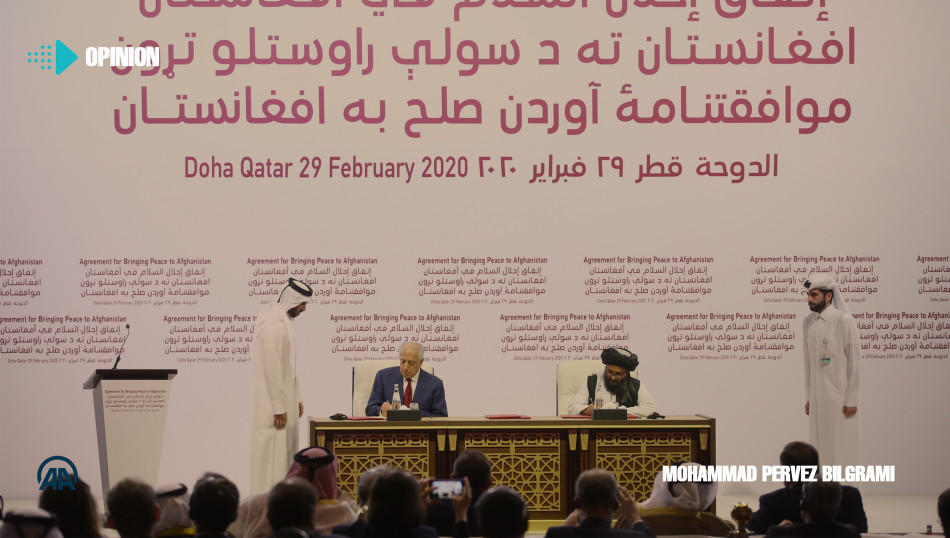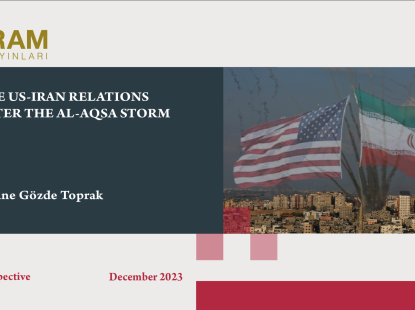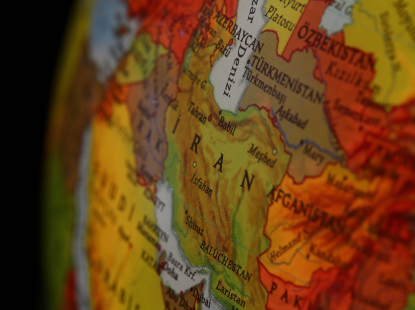Iran's Reaction to the US-Taliban Deal
The United States and the Taliban signed a peace deal in Doha on February 29, after 18 months of negotiations and nearly 20 years of war. The signing of the peace deal was witnessed by the representatives of Pakistan, Turkey, India, Indonesia, Tajikistan, Uzbekistan, and the host Qatar. However, the Iranian representatives were neither invited to the ceremony in Doha nor to the proceedings of the 10 rounds of negotiations, despite the list of invitees’ including the actors of lesser importance.
The first formal reaction by the Iranian officials came in the form of a statement by the Ministry of Foreign Affairs on March 1. It stated: “The Islamic Republic of Iran believes lasting peace will be established in Afghanistan only through intra-Afghan talks attended by the country’s political groups, including the Taliban, while taking into account the considerations of Afghanistan’s neighbouring countries.” Later, Iran’s Foreign Minister Javad Zarif expressed his country’s annoyance at the peace deal on Twitter, saying the “US occupiers” should have never invaded Afghanistan, but they did, and “blamed everyone else” for the consequences. “Now after 19 years of humiliation, the US has tendered its surrender,” he said, adding that the US will be leaving a huge mess behind.
The Iranian exasperation over the peace deal emanates from the likely outcome in Afghanistan and the nation’s fear of losing its Afghan assets created following the US invasion. The memories of the Iranian-Taliban hostilities still have not faded for both sides: how the Taliban overran the Iranian consulate in Mazar-i-Sharif in 1998; and how later Iran took revenge by supporting the Great Satan’s invasion of Afghanistan that ousted the four-year rule of the Taliban in Kabul. To continue, Iran’s view of its ideological nemesis the Taliban has considerably evolved and both sides have conducted numerous direct talks in the past few years. On the other hand, during the latest round of talks, Zarif welcomed the Afghan leader Mullah Abdul Ghani Baradar to Tehran to discuss various wide-ranging issues, three months prior to the US-Taliban peace deal being signed.
The 2001 ouster of the Taliban was favorable to the Iranian interests and as a result Iran supported the US invasion of Afghanistan. It consequently helped Iran to exert its influence in the post-Taliban Afghanistan. Afghanistan is now going back to the pre-US invasion period, where the Taliban will not allow Iran to play the Hazara Shia card. Indeed, it is true that Iran is frustrated with America, because of Washington’s superpower politics of war and peace designed to secure its own interests. A country like Iran must have known that, Afghanistan under the control of the US will neither surrender Afghanistan upon Iran’s invitation nor will depart from the country as Iran desires. Iran's main fear is that the US withdrawal from Afghanistan will result in handing over the nation to the very group that it bombed to dust and then removed it from power approximately 20 years ago. Also, with the Taliban back in power, Iran will lose whatever influence it gained in the Afghan power structure of the post-2001 period and there will be a repetition of the 1996 Taliban triumph, which will strengthen Pakistan's hand in dealing with the Taliban-ruled Afghanistan. They will not allow Iran to execute its power in Afghanistan. Furthermore, it is most likely that Pakistan's control of Afghanistan through the Taliban power will undermine Iran’s influence in Afghanistan and will further challenge Tehran’s influence in South Asia, Central Asia, and the Middle East.
The incessant anti-government protests in Iran’s own cities, the anti-Iran protests in Iraq and Lebanon, the US killing of Qasem Soleimani, the point military man responsible for exporting the revolution in Iran, the deadly coronavirus outbreak, the harsh US sanctions, and the lowest crude oil price in decades have put Iran in the midst of numerous predicaments. Given these circumstances, whatever Iran had previously negotiated with the Taliban forces in the past few years, its engagement with first the Taliban-led and later the Taliban-owned government will go through Pakistan and this new situation will compel Iran to compromise with the Pakistan-Taliban alliance on many regional issues such as the trade routes to Afghanistan and Central Asian Republics and the resolution of the Middle East conflicts in which Iran is involved.
Moreover, Iran's organic link with the Hizbe Wahadat umbrella organization of the Hazara and the Qizilbash Shia minority in Afghanistan, who fought against the Taliban in the alliance of the Persianite Tajik-dominated Northern Alliance. Later the same block joined forces with the US-backed NATO units in ousting the Taliban forces and in return they received a fair share in the US-backed system in Kabul. Also, the Taliban’s Islamic Emirate of Afghanistan will inherently be in conflict with Iran’s Shiite-based political system of the Vilayat-e Faqih (supreme leader). On the other hand, the most damaging factor for Iran will be the questioning of the legitimacy of Iran’s theological governing system. In addition, the Taliban’s apparent victory will be a huge psychological defeat for Iran’s devoted supporters worldwide. Iran would never want its ideological nemesis to emerge victorious militarily against the American forces. Taliban's military success against the American occupation forces and its return to power constitutes an enormous challenge to Iran's four decades of monopoly of fighting against the US with little success.
The routine of anti-US sloganeering implemented by the Iranian officials does not actually mean that Iran prefers the US to abandon Afghanistan. But, Iran would rather prefer to have the residual US forces in Afghanistan as long as possible and/or leave the country after setting up a new power-sharing deal that ensures the participation of its allies. However, none of the imminent consequences stemming from the US leaving Afghanistan, especially concerning a full Taliban dominance, will serve Iran's interests. The Shia populations in countries like Iraq, Yemen, Syria, and Lebanon are vulnerable and all of these places are socially, politically, and economically unstable and ridden with sectarian conflicts. Afghanistan has all the necessary ingredients of a place where Iran can exert its influence in a civil war environment and use considerable amount of the Shia Hazara population and linguistic kinship with the Tajik population to its advantage. The US-Taliban deal in Afghanistan is primarily a deal of the three: the US, the Taliban, and Pakistan. Also, it will naturally increase Pakistan’s foothold in Afghanistan and would be seen as nightmarish by Iran.
A new situation is evolving for Iran as thousands of Afghan Hazara Shias are dying from safeguarding the Iranian interests in Syria, but the situation will become redundant in their homeland after the Taliban takes control of Afghanistan. Iran’s displeasure with the US-Taliban deal is also shared by India. Both fear that it increases Pakistan’s influence. The two countries may act jointly and try to revive the Northern Alliance-type anti-Taliban umbrella group. Although the revival of such an anti-Taliban alliance will be difficult in a distinct geopolitical environment when big powers — the US, China, Russia, Turkey, and Central Asian republics — that once supported the Northern Alliance are now backing the peace deal with the Taliban.
Disclaimer: The viewpoints expressed by the authors do not necessarily reflect the opinions, viewpoints and editorial policies of IRAM.
- Tags:
- Afghanistan
- the Taliban
- the US
- Iran











